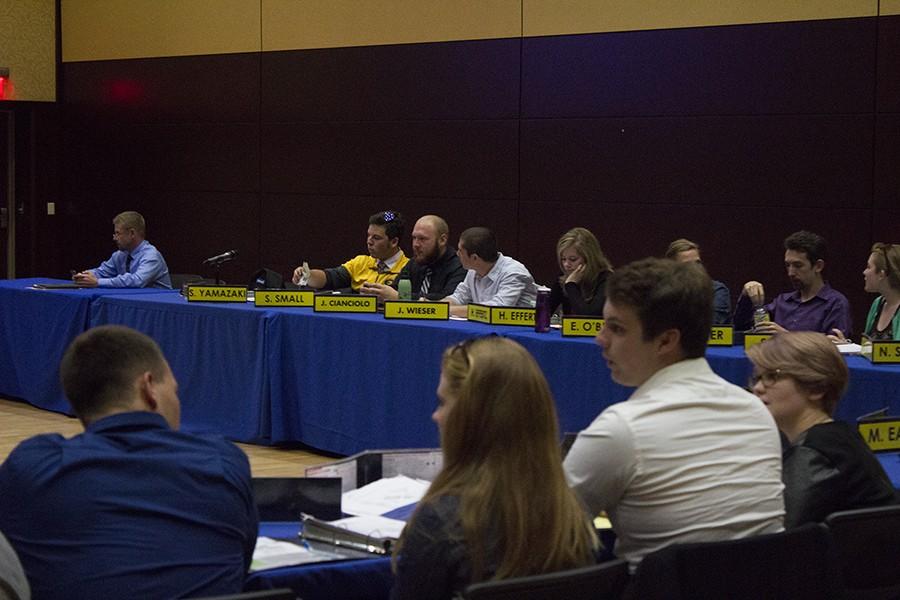Student Senate votes on resolution to oppose Campus Carry Act
Potential bill would allow guns in college classrooms
More stories from Lauren French
Photo by FILE PHOTO
Student Senate voted 25-4-1 on a resolution Monday to officially oppose the bill circulated last week that would allow persons with concealed carry permits to carry firearms in UW and technical college buildings.
UW-Eau Claire Senate President Jake Wrasse and other Senate officials traveled to the state capitol on Tuesday to hand-deliver copies of the resolution to legislators.
Rep. Jesse Kremer, R-Wis., and Sen. Devin LeMahieu, R-Wis., circulated the Campus Carry Act about two weeks after a shooter killed nine people on an Oregon community college campus.
State law already allows CCW-certified people to carry guns on campuses, but not inside buildings, and the expansion of firearms into classrooms and residence halls faces controversy across the state.
Wrasse said the CCA might offer some students peace of mind in the event of an active shooter, but he said the potential risks involved with this bill “far outweigh the supposed benefits.”
One of these risks, he said, involves accidental injury. Wrasse said CCW-certified people aren’t specifically trained to deal with an active shooter situation, and other students may be hurt in the crossfire.
“We’re saying the answer to an active shooting police situation is to give a civilian… a gun and expect them, in the midst of a 150-seat lecture hall with people trying to escape and climbing over desks, to take out an active shooter?” Wrasse said. “I don’t know (if) that brings the shooting to its conclusion any faster.”
Wrasse said mental health on campus is an important consideration, too. He said the presence of guns on campus is “troubling” for students who are depressed or suicidal, and that having a gun might make it easier for those students to end their life.
While the majority of student senators voted for the resolution, some disagreed with Student Senate taking an official stance against the act. Some senators said the act would allow live shooter situations to be extinguished earlier.
Senator Jonathan Wieser said it could take police five to 10 minutes to arrive on scene when someone calls to report a shooting.
“A lot could happen in that time,” Wieser said. “If we had concealed carry, it could be stopped pretty much the instant the gun is brought out, saving a lot of lives in the process.”
Other senators said CCW permit holders have received training and are capable of operating firearms safely.
In order to obtain a CCW license, the Wisconsin Department of Justice requires at least one of the following:
– A copy of a hunter education certificate.
– A copy of a current or expired CCW license from another state.
– Documentation of completion of small arms training while serving in the U.S. Armed Forces, Reserves or National Guard.
– A certification letter from the Wisconsin Law Enforcement Standards Board or a letter from a police department stating you served as a police officer and completed training.
– Documentation showing completion of private security training from the Department of Safety and Professional Services or a similar course in another state.
– A certificate of completion from a firearms safety or training course that is conducted by a national or state organization.
Senior marketing analytics student, Amy Schick, said a number of the CCW requirements make her feel comfortable with certified students, faculty and staff carrying firearms in the classroom.
However, Schick said a hunter education certificate alone is not strict enough to make her feel confident in another’s ability to take down an active shooter.
“I feel like it could be too easy for someone to carry a gun on campus legally,” Schick said. “How would I know that they’re not trying to gun down the school?”
Eau Claire Campus Police have expressed similar concerns. Chief of Police, David Sprick, said a law permitting guns in university buildings would complicate police response to an active shooter situation.
“We might not be able to distinguish a law-abiding citizen who’s trying to help out from the suspect or perpetrator,” Sprick said.
Sprick said CCW permit holders are not adequately trained for an active shooter situation. He said most have only practiced with non-moving targets and have never practiced on moving marks in the midst of chaos.
Complications aside, Sprick said the CCA would not benefit a place like Eau Claire or other UW System and technical college locations because of low crime rates.
An FBI study on active shooter incidents nationwide between 2000 and 2013 indicates that college campuses are some of the safer places to be in terms of gun violence. According to the study, 45.6 percent of all shootings occurred in places of commerce, and 7.5 percent took place on higher education grounds.
Wrasse said the Campus Carry Act is still informal and the best way to make sure students’ voices are heard is to contact state legislators.
“If they’re (legislators) suddenly getting emails from people across the state of all different backgrounds and political beliefs,” Wrasse said, “that sends a powerful message.”











